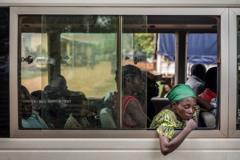The plight of refugees from the Democratic Republic of Congo represents the struggles against US immigration policy shifts aimed at prioritizing certain groups over others. Among them is a family left in limbo as they've sold all belongings for a new life in the US, only to face abrupt cancellations. This situation has ignited discussions regarding fairness and discrimination among various refugee populations.
Unfair Refugee Dynamics: Struggles of Congolese Families Amid US Policy Changes

Unfair Refugee Dynamics: Struggles of Congolese Families Amid US Policy Changes
Amid drastic US immigration shifts, many refugees from conflict zones face uncertainty while a select group of Afrikaners are fast-tracked for resettlement.
Thousands of civilians are suffering in turmoil, with armed militias wreaking havoc in regions like the Democratic Republic of Congo (DRC). Families fleeing violence and seeking refuge in safer areas are now caught in a web of confusion due to the abrupt changes in US immigration policy. One family, who wishes to remain anonymous and goes by Pacito, traveled from the DRC to Kenya, expecting a flight to the US as refugees. However, their plans were shattered just hours before departure when US President Donald Trump suspended the refugee program.
Now, stuck in Kenya, the family is grappling with uncertainty after selling their belongings for the anticipated resettlement. “I didn't have anywhere else to go,” Pacito shared, recounting their difficult situation. “We've waited for years, but now these Afrikaners are just processed in like three months.” His words resonate with many others who feel abandoned amidst evolving policies that appear to favor select groups.
Under Trump's administration, immigration policies have shifted dramatically from the previous administration's approach. While Biden's tenure saw over 100,000 refugees finding a home in the US, Trump's presidency has placed severe restrictions on immigration pathways. An executive order allowing white South African Afrikaners to enter the US, citing their alleged persecution, has drawn ire and confusion from many other refugees.
The contrast in treatment, with the plight of Afrikaners fast-tracked while countless families from war-torn regions, such as those from the DRC and Gaza, await uncertain futures, raises serious questions about fairness and the criterion for refugee acceptance in the US. Many refugee advocates argue that humanitarian pathways should be accessible to all persecuted groups without bias.
Among those echoing these sentiments is Amjad Hammad, a Palestinian refugee currently in Egypt. He expressed disbelief that the US administration prioritized white South Africans over other crisis-hit groups. He questioned, “What are the Palestinians facing if the people in South Africa are facing a genocide?” Such queries reflect a broader discontent over perceived inequities in the US immigration system.
As Pacito and his family navigate life in limbo, often struggling for food and shelter, they cannot fathom returning to the dangers of the DRC. Their families have been tragically impacted by ongoing conflict, leaving them with no secure option. “I can't go back,” he stated, highlighting the dire circumstances many refugees face as they look for safety and a new start in life.

















